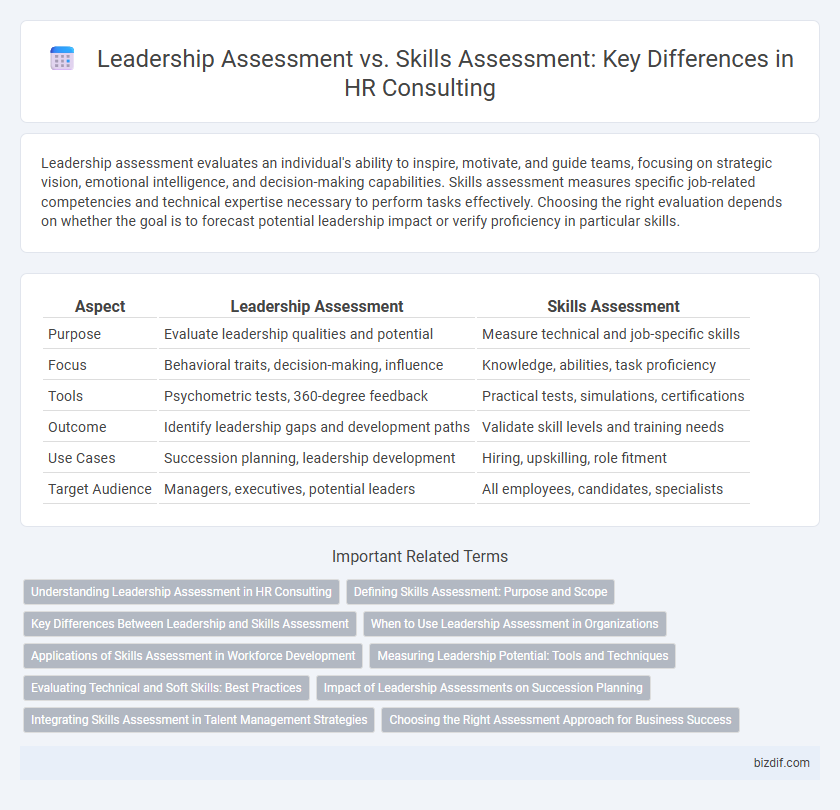Leadership assessment evaluates an individual's ability to inspire, motivate, and guide teams, focusing on strategic vision, emotional intelligence, and decision-making capabilities. Skills assessment measures specific job-related competencies and technical expertise necessary to perform tasks effectively. Choosing the right evaluation depends on whether the goal is to forecast potential leadership impact or verify proficiency in particular skills.
Table of Comparison
| Aspect | Leadership Assessment | Skills Assessment |
|---|---|---|
| Purpose | Evaluate leadership qualities and potential | Measure technical and job-specific skills |
| Focus | Behavioral traits, decision-making, influence | Knowledge, abilities, task proficiency |
| Tools | Psychometric tests, 360-degree feedback | Practical tests, simulations, certifications |
| Outcome | Identify leadership gaps and development paths | Validate skill levels and training needs |
| Use Cases | Succession planning, leadership development | Hiring, upskilling, role fitment |
| Target Audience | Managers, executives, potential leaders | All employees, candidates, specialists |
Understanding Leadership Assessment in HR Consulting
Leadership assessment in HR consulting evaluates an individual's ability to influence, inspire, and guide teams towards achieving organizational goals, emphasizing emotional intelligence, decision-making, and strategic thinking. Unlike skills assessment, which measures specific technical competencies or job-related abilities, leadership assessment focuses on behavioral traits and potential for growth in leadership roles. This approach enables organizations to identify high-potential leaders and design tailored development programs that align leadership capabilities with business objectives.
Defining Skills Assessment: Purpose and Scope
Skills Assessment serves as a critical tool in HR consulting to evaluate an individual's technical abilities and proficiency related to specific job functions. This process focuses on measuring both hard skills, such as coding or data analysis, and soft skills, including communication and teamwork, to ensure alignment with organizational needs. By accurately defining the purpose and scope of Skills Assessment, businesses can identify skill gaps, tailor development programs, and enhance overall workforce performance.
Key Differences Between Leadership and Skills Assessment
Leadership assessment evaluates qualities such as decision-making, emotional intelligence, and strategic thinking to identify potential leaders and their ability to inspire teams. Skills assessment measures specific technical abilities and competencies required for job performance, focusing on knowledge and task execution. The key difference lies in leadership assessment emphasizing behavioral traits and vision, while skills assessment targets measurable expertise and proficiency.
When to Use Leadership Assessment in Organizations
Leadership assessment is essential when organizations aim to identify high-potential employees capable of driving strategic initiatives and managing teams effectively. It is most effective during succession planning, leadership development programs, and critical executive hiring processes to ensure alignment with organizational culture and vision. Utilizing leadership assessment tools helps organizations predict performance in complex decision-making and interpersonal dynamics, which skills assessments alone cannot measure.
Applications of Skills Assessment in Workforce Development
Skills assessment in workforce development provides precise measurement of employee competencies, enabling targeted training programs that enhance job performance and productivity. It assists HR consultants in identifying skill gaps, facilitating personalized learning paths and succession planning. Integrating robust skills assessment tools supports strategic talent management and aligns workforce capabilities with organizational goals.
Measuring Leadership Potential: Tools and Techniques
Leadership assessment tools such as 360-degree feedback, personality inventories, and situational judgment tests provide comprehensive insights into an individual's capacity to inspire, strategize, and drive organizational change, unlike skills assessments which primarily evaluate technical competencies. Techniques like behavioral interviews and simulation exercises specifically target leadership potential by measuring decision-making, emotional intelligence, and adaptability in high-pressure scenarios. Effective leadership potential measurement integrates psychometric evaluations with real-world performance data to predict future success and guide development pathways in HR consulting.
Evaluating Technical and Soft Skills: Best Practices
Leadership assessment emphasizes evaluating soft skills such as emotional intelligence, communication, and decision-making crucial for effective team management and strategic vision. Skills assessment focuses on technical proficiency and job-specific competencies necessary for operational performance and problem-solving within a role. Combining both approaches through structured interviews, psychometric tests, and real-world simulations ensures a comprehensive evaluation that aligns talent capabilities with organizational goals.
Impact of Leadership Assessments on Succession Planning
Leadership assessments provide critical insights into executives' decision-making abilities, emotional intelligence, and strategic vision, directly influencing the effectiveness of succession planning. By identifying high-potential leaders and evaluating their capability to drive organizational change, companies can tailor development programs that align with future leadership needs. This targeted approach ensures a robust talent pipeline, reducing leadership gaps and enhancing long-term organizational stability.
Integrating Skills Assessment in Talent Management Strategies
Integrating skills assessment into talent management strategies enhances leadership development by identifying specific competencies that drive performance and alignment with organizational goals. Leadership assessment focuses on potential and behavioral traits, while skills assessment provides measurable data on technical and soft skills critical for role success. Combining both assessments enables HR consulting firms to create targeted development plans, optimize succession planning, and improve overall workforce capability.
Choosing the Right Assessment Approach for Business Success
Leadership Assessment evaluates an individual's ability to inspire, influence, and drive organizational vision, focusing on qualities like emotional intelligence, decision-making, and strategic thinking. Skills Assessment measures specific technical competencies and job-related abilities essential for operational performance and task execution. Selecting the right assessment approach depends on identifying whether the business needs to develop visionary leaders or enhance workforce capabilities to achieve sustainable success.
Leadership Assessment vs Skills Assessment Infographic

 bizdif.com
bizdif.com